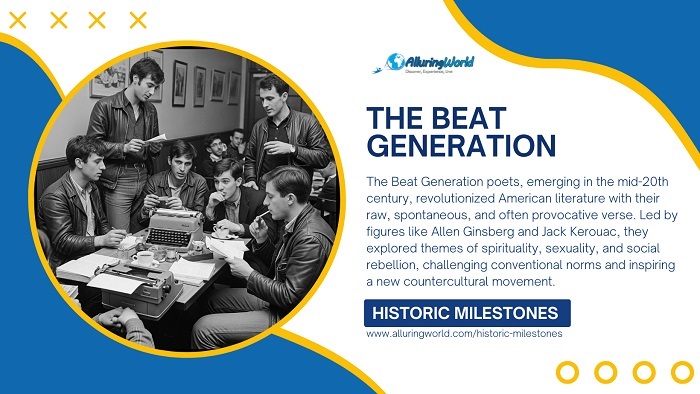Read time ca. 4 minutes
Emerging in the late 1940s and flourishing throughout the 1950s, the Beat Generation was a literary and cultural movement that challenged the prevailing norms of postwar American society. Disillusioned by the materialism, conformity, and conservative values of the time, a small group of writers sought to redefine artistic expression and personal freedom. At the heart of this movement were Jack Kerouac, Allen Ginsberg, William S. Burroughs, and others who embraced spontaneity, spiritual exploration, and raw honesty in their work. The term “Beat” suggested multiple meanings—tired or beaten down by society, but also beatific, as in a state of blessedness or enlightenment.
Jack Kerouac and the Call of the Road:
Jack Kerouac emerged as the preeminent voice of the Beat Generation, and this was largely due to his groundbreaking 1957 novel titled On the Road. This seminal work perfectly encapsulated the restless energy and profound search for meaning that characterized his generation, so his distinctive writing style, which he termed bop prosody, was spontaneous and free-flowing, mirroring the improvisational nature of jazz. The novel itself chronicled his cross-country journeys across America with a colorful cast of friends, depicting their explorations of jazz music, experimental drug use, and an increasing fascination with Eastern spirituality.
Through these travels and experiences, Kerouac’s characters grappled with a perceived emptiness in the prevailing consumer culture, desperately seeking authenticity and genuine experience, so they found fleeting moments of liberation in constant movement, acts of rebellion, and deep personal connections forged on the road. On the Road quickly transcended its literary status to become a defining text of postwar counterculture, leaving an indelible mark on subsequent generations of writers, musicians, and intellectual figures.
Allen Ginsberg and the Power of the Spoken Word:
Allen Ginsberg’s 1956 poem titled Howl, functioned as a literary grenade which shattered conventional poetic forms and content with its explicit language, raw emotional intensity, and overt critique of modern American society. The poem famously opens with the line: I saw the best minds of my generation destroyed by madness, and from there, it paints a vivid and often disturbing portrait of alienated youth desperately seeking transcendence in an unforgiving and conformist world. Howl vividly depicted the struggles and unconventional lifestyles of those on the fringes, capturing their despair and their defiant pursuit of meaning outside mainstream norms.
Still, the provocative nature of the poem led to a landmark obscenity trial that significantly challenged American censorship laws of the time. This trial ultimately affirmed the poem’s artistic merit and its right to exist as a work of literature, marking a crucial moment for free speech in the United States. Beyond his poetic achievements, Ginsberg’s unwavering advocacy for free expression, sexual liberation, and social justice solidified his position as a central and influential figure, not only within Beat literature but also in the broader countercultural movement that gained momentum throughout the 1960s.
Philosophy, Influence, and Legacy:
The Beat Generation transcended the confines of a mere literary circle; it represented a sweeping cultural revolt against the perceived rigidity, societal repression, and spiritual emptiness of post-war America. As mentioned above, the Beat Generation was heavily influenced by the improvisational freedom of jazz music, the contemplative principles of Zen Buddhism, and the introspective depths of existential philosophy, which in turn made the Beats actively sought out novel ways of existing and experiencing the world. Their profound and vocal rejection of rampant consumerism, pervasive militarism, and entrenched institutional authority served as a crucial foundation, laying the groundwork for the significant cultural upheavals that would define the 1960s.
The impact of the Beat Generation resonated far beyond their immediate literary output. They directly inspired the burgeoning hippie movement, played a key role in igniting the sexual revolution, and were instrumental in introducing American readers to Eastern thought and spirituality long before such ideas became widely accepted or mainstream. Through their groundbreaking work transformed poetry and prose into powerful vehicles for social protest, profound personal exploration, and the forging of deep, authentic communal connections.
Conclusion:
Overall, the Beat Generation was more than a literary phenomenon—it was a radical departure from the conventions of its time, a howl against conformity, and a search for truth in all its messy, ecstatic, and painful forms. Through their fearless writing and unconventional lives, Kerouac, Ginsberg, and their contemporaries reshaped American culture, leaving behind a legacy of rebellion, creativity, and spiritual yearning that still echoes through literature, music, and activism today.

